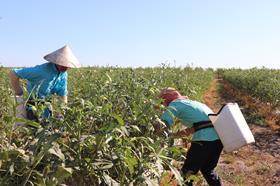
The Australian Fresh Produce Alliance (AFPA) has welcomed the funding for the Australian Agriculture Visa (AgVisa) and Pacific Australian Labour Mobility (PALM) scheme announced as part of the Mid-Year Economic and Fiscal Outlook.
The AgVisa will receive A$87.2m over the next four years to address workforce challenges in the industry.
“This funding will ensure the implementation of a visa that includes high standards for employers and robust programme management. The AgVisa is a key piece of policy that will enable the fresh produce industry to continue to develop a productive and returning workforce” said AFPA chief executive, Michael Rogers.
Funding for the AgVisa includes $8.7M of funding for the Fair Work Ombudsman (FWO). The AFPA previously called for additional funding for the FWO to support the horticulture sector in education, compliance, and enforcement.
“We’ve previously called for additional funding to FWO to develop a horticulture taskforce. As the industry moves towards more regulated migration programmes, we need to make sure that the regulator is appropriately resourced to be able to enforce standards and ensure compliance within the sector,” said Rogers.
The first phase of recruitment under an AgVisa is expected to occur early in 2022, with a second implementation phase to follow.
“We’re pleased with the development of the AgVisa to date and the incorporation of key measures like minimum English language requirements, welfare support and accommodation standards being included to support AgVisa holders working in the sector,” added Rogers.
The Pacific Australia Labour Mobility (PALM) scheme will also receive A$81.3m over the next four years in funding to support the merger of the Seasonal Worker Programme and Pacific Labour Scheme.
Earlier reforms to the PALM scheme saw the increase of many employers’ recruitment caps, making it possible to increase the number of Pacific workers employed in the sector.
“Members of the AFPA remain committed to the PALM scheme including the ongoing recruitment and skill development of Pacific workers as well as the management of worker welfare, protection and support,” Rogers explained.
Additional measures to support the horticulture industry include A$30m in funding for management of fruit fly, and an additional A$154.5m to support Australian exporters, modernise Australia’s trade system and streamline border clearance services.



